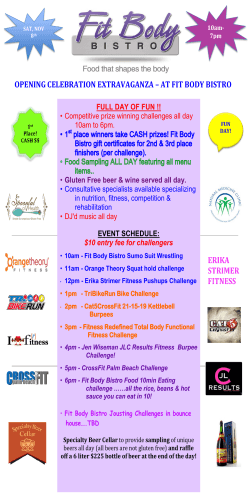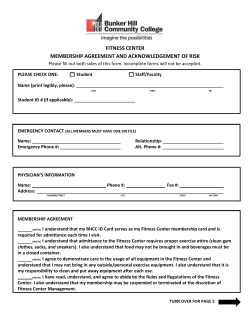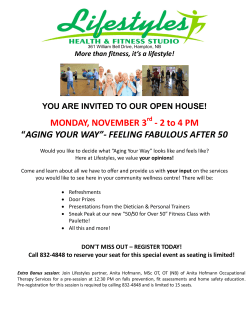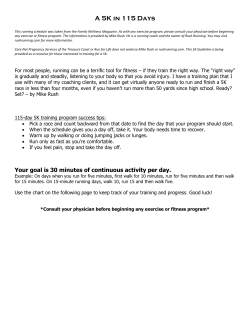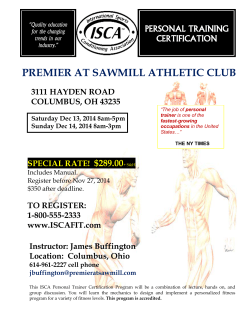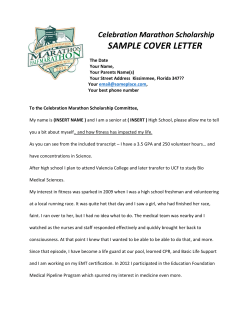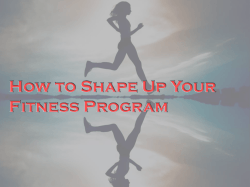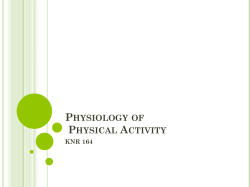
Live Longer, Stay Younger, 20 Minutes Per Day
This book offers a simple program to help us attain good health and fitness for those who want to spend minimal time doing it. The procedures can be done in concert with other fitness programs, and encourage personal involvement in an individual's personal health and fitness. The goal of the program is to help one enjoy better health, have fewer sick days, and minimize unscheduled medical visits. Live Longer, Stay Younger, 20 Minutes Per Day for a Stronger Body Order the complete book from Booklocker.com http://www.booklocker.com/p/books/7834.html?s=pdf or from your favorite neighborhood or online bookstore. Your free excerpt appears below. Enjoy! LIVE LONGER, STAY YOUNGER, 20 MINUTES PER DAY FOR A STRONGER BODY LOUIS J. KATZ, O.D., M.P.H., D.O.S. Copyright © 2014 Louis J. Katz, O.D., M.P.H., D.O.S. ISBN 978-1-63263-370-5 All rights reserved. No part of this publication may be reproduced, stored in a retrieval system, or transmitted in any form or by any means, electronic, mechanical, recording or otherwise, without the prior written permission of the author. Published by BookLocker.com, Inc., Bradenton, Florida. Printed in the United States of America on acid-free paper. BookLocker.com, Inc. 2014 First Edition CHAPTER 2: What is Fitness? Fitness is defined as the ability to perform physically demanding activities, including daily life activities, including work and recreation, for an extended period of time. The four basic components of physical fitness are: (5) • • • • Cardiorespiratory, which involves the heart and lungs, also called aerobic activity Muscular Flexibility or stretching Body composition (fat versus muscle) Cardiorespiratory Fitness Cardiorespiratory fitness is concerned with the condition and function of the heart, lungs, and blood vessels. As a person exercises, the body requires additional oxygen and nutrition in order to bring about positive changes in the cardiorespiratory system. This type of exercise can improve stamina, allowing you to perform all the tasks required for daily independent living. It may delay or prevent many diseases associated with aging such as diabetes, colon cancer, heart disease and stroke, as well as reduce hospitalization and risk of death. Muscular Fitness This category is divided into muscular strength and endurance. Muscular strength relates to the maximum amount of force exerted, like how much weight you can lift at one time. Muscular endurance involves the length of time muscles can function continuously – like how many times you can lift a small weight. Muscular fitness exercises provide you with more strength to do 13 LIVE LONGER, STAY YOUNGER, things on your own. They also increase your metabolism, helping you regulate your weight and blood sugar. Flexibility Fitness The essence of flexibility involves the ability to move joints through their entire normal range of motion. Stretching helps keep a body limber by stretching the muscles and tissues that hold body structures in place. Flexibility enables you to touch your toes, raise your arms over your head or reach behind your back with both hands and touch them. It may play a role in preventing falls. Body Composition The human body is composed of a variety of different tissue types that are metabolically active, including lean tissues -- like muscle, bone, and organs, and fat (adipose) tissue that is not active. Body composition deals with body fat. Body fat is reserve energy stored for future needs. Everyone has some body fat, but too much can lead to diseases such as diabetes, arthritis, heart and blood vessel ailments. This book will only deal with the component of physical fitness as it relates to exercise and nutrition. For the following muscle http://www.buildingmuscle.org. anatomy, 14 please refer to 20 MINUTES PER DAY FOR A STRONGER BODY Please refer to appendix D for more information regarding muscles shown above. 15 CHAPTER 7: Stress and Physical Fitness Stress is the reaction of the body to any demand made upon it. Stressors are the situations which cause stress. Any and every situation you come across may cause stress. Tractate Shabbat 10a in the Talmud tells a tale of two dedicated judges who worked such long hours, they were overcome with fatigue. When Rabbi Chiyya, an observer, saw their exhaustion, he advised the two scholars to limit their hours in court. The rabbi’s statement requires clarification. Great individuals aspire to help others to the best of their abilities. The two judges felt they could best serve their community by bringing social justice and order through the framework of the judicial system. Therefore, they invested all of their time and energy in judging the people. For these scholars, any other activity would be a lesser form of divine service. However, their dedication to public service was so intensive that it came at the expense of their own personal welfare, both physical and spiritual. While public service is truly a wonderful thing, it is not necessary to neglect all other aspects of life. It is better to have an hour of productive activity in a fresh, relaxed state of mind and body, than spend many hours of constant toil in a tired and frenzied state. The time that we devote to physical and spiritual renewal help us in our public roles; they become an integral part of our higher aspiration to serve the community. (104) We each have stress, but its intensity and duration may vary greatly depending on the events that trigger it and on the way each individual manages personal feelings. Nothing influences your life as much as the way you feel. Whenever possible, you should try to identify your moods. Take time to notice how often you are really happy with yourself. (105) 107 LIVE LONGER, STAY YOUNGER, A good, basic guide to determine when you need help in managing your stress is to ask yourself, “Do my feelings get in the way of doing my best work or my ability to love and be loved?” If the answer is yes, the extent to which your feelings interfere is the extent to which they need to be managed. Let your discomfort with yourself be your guide. (105) Regarding mind over body, Maimonides wrote, My Lord, let God prolong his days, should he know that emotional experiences cause marked changes in the body which are clear and visible to all and bear witness in clear testimony. You see a man strongly built whose voice is powerful and pleasant and whose countenance changes; his posture becomes low and his voice hoarse and weak. If he wants to raise his voice with all his power, he is unable to do so. His strength weakens, occasionally he trembles from great debility, his pulsating [blood] vessels become thin and powerless. The appearance of his eyes change and his eyelids are too heavy to move. The surface of his body becomes cool and the desire for food is lost. The cause of all these manifestations is that the natural warmth and the blood enter deep into the body. You see quite the reverse in a man whose body is weak, whose appearance is strange and whose voice is low. When something happens to him which causes him to rejoice greatly, you will see how his body becomes strong, his voice rises, his face brightens, his movements become rapid, his pulsating (blood) vessels become strong and wide, his body surface becomes warm and joy and gladness becomes manifest in his face and eyelids. His condition is clear, cannot be hidden and is recognizable without any effort. And the cause of all these events is the spread of the natural heat and of the blood to the surface of the body. (106) Stress causes the body to prepare for action. What you do next determines whether stress is good or bad for you. Think back to the last time you were happy and remember what actions followed. Most likely you became involved in some activity; when you are happy and feel good, you tend to be active. Now think back to the last time you were sad or angry and remember how you responded at that time. Most likely, your reaction to either feeling was to withdraw and be inactive. 108 20 MINUTES PER DAY FOR A STRONGER BODY When the body is ready for action, it needs an outlet for its emotion and energy. Happy people are usually outgoing and active. Activity expends this energy and relieves these emotions which have accumulated. On the other hand, anger or sadness tend to make people withdraw and focus their energy and emotions inward. This is a little like running a car engine in gear at full throttle with the emergency brake on. Your body is prepared for action, but you do nothing, yet all that energy must be used. Repeated situations involving unused or “bottled” energy can cause ulcers, burnout or breakdowns. (105) Maimonides wrote: Physicians have commanded the observation of emotional changes and keeping them always under consideration, trying to equalize them in health or disease, without allowing any other behavior to take precedence. The physician must keep in mind that the heart of every sick person is narrow and that every healthy person has an expanded soul and therefore the physician must remove emotional experiences that cause a shrinking of the spirit. In this way, the health of the normal person will be extended and this is the law in the cure of a patient, especially if the illness is concentrated in the powers of the soul and its parts, such as disease of the diaphragm or the brain, causing turbulent thoughts and melancholy. Special care should be taken in the observation of the emotional movements. When one is overpowered by imagination, prolonged meditation and avoidance of social contact, which he never exhibited before, or when one avoids pleasant experiences which were in him before, the physician should do nothing before he improves the soul by removing the extreme emotions. (107) People who lack physical fitness may experience many physical and mental problems. When you are not fit, you feel aches and pains; various parts of your body may also malfunction. You also tend to avoid exercise because it is too hard. If you do not exercise, you become more unfit and find it even harder to exercise. This becomes a vicious cycle which contributes to your stress levels. Being unfit probably is an indication that you are inactive and your feelings are directed inwardly. (108) 109 LIVE LONGER, STAY YOUNGER, Studies have shown that physical activity reduces stress. (109, 110, 111) Each time you work out, you can reduce your stress instead of letting it build up. If you exercise, you use pent-up energy and are more outgoing than if you direct all your energy and emotion inward. (108) Since the body adapts to the level of activity being demanded of it, you will have more energy and accomplish more at your job if you exercise. The key, as in all preventive programs, is early detection and intervention before stress levels can lead to stress-related diseases such as alcoholism and emotional disorders. (108) The emotional component of health often affects the physical, physiological component. Stress, strain and tension both from inside and outside the home lead us to seek help from others to maintain our overall state of health. Spiritual faith creates for us a strength, a hope and a power that provides us with the courage to cope with many of the major difficulties that may affect us and our families. Faith provides an individual strength. It affords us patience during periods of long illnesses and suffering, courage to face the unknown, and confidence in our care and treatment. (112) An increasing volume of scientific study shows that meditation not only helps reduce stress, but offers some physiological clues about why it might be beneficial to the body and brain. (115, 116,) Recent studies of mindfulness meditation have shown evidence this activity may bolster the immune system and slow the progression of disease in patients with HIV/AIDS, improve blood pressure and reduce psychological distress in young adults, improve the emotional well-being and mental health of breast cancer patients and may be as effective as medications in treating insomnia. (114) 110 20 MINUTES PER DAY FOR A STRONGER BODY “Mindfulness is a natural basic science,” says executive director of the Mindsight Institute in Southern California Daniel J. Siegel, M.D., an associate clinical professor of psychiatry and researcher at the UCLA School of Medicine. He adds, “It does not just reduce stress; it has now been shown to be crucial to your ability to promote the growth of your mind. An initial three minutes of focused breathing a day works the way a walk around the block might for a couch potato. You change the regulatory circuits in the brain.” (114) The following are some tips to practice to help reduce stress levels: • • • • • • • • • • • • Eat right and EXERCISE Handle important tasks first and eliminate nonessential tasks Take a break and meditate to slow your mind Reduce the urge to be “perfect” Be flexible Be patient and understanding with others Push away negativity of any kind; be positive with words and deeds Give yourself “me” time Be cheerful; it reduces the levels of others’ stress and anxiety Use relaxation techniques like yoga, meditation, breathing, stretching, prayer Laugh more Avoid the influence of extreme beliefs and values Maimonides says, “Be optimistic,” adding, “The thought that brings worry to the spirit over what is going to come or happen in the future lends itself to the following observation: Whatever a man fears may happen to him is only a matter of probability, either it will happen or it will not happen. Just as it is possible 111 LIVE LONGER, STAY YOUNGER, that something painful, worrisome and fearful may happen, it is also possible that, because of his reliance on God, the reverse of what he feared may happen. (113) Therefore, BE OPTIMISTIC. 112 This book offers a simple program to help us attain good health and fitness for those who want to spend minimal time doing it. The procedures can be done in concert with other fitness programs, and encourage personal involvement in an individual's personal health and fitness. The goal of the program is to help one enjoy better health, have fewer sick days, and minimize unscheduled medical visits. Live Longer, Stay Younger, 20 Minutes Per Day for a Stronger Body Order the complete book from Booklocker.com http://www.booklocker.com/p/books/7834.html?s=pdf or from your favorite neighborhood or online bookstore.
© Copyright 2026

